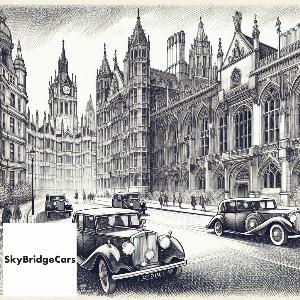Exploring Britains Traditional Stonemasonry and Carving Workshops by Minicab

Historical Overview of Britain's Stonemasonry
Britain's stonemasonry history is a rich tapestry that dates back to the Roman era. This ancient craft has shaped the country's architectural landscape, with iconic structures like the Tower of London and Westminster Abbey standing as testaments to the skill and artistry of British stonemasons. Over the centuries, the techniques and styles have evolved, yet the essence of the craft remains rooted in tradition. Today, visitors can explore Britain's traditional stonemasonry and carving workshops by transfer. These tours offer a unique insight into the intricate processes involved in shaping stone into beautiful designs. From the initial rough hewing to the final detailed carving, each step is a testament to the stonemason's skill and dedication. These workshops also provide a glimpse into the history of British stonemasonry, showcasing tools and techniques that have been passed down through generations. Whether you're a history enthusiast or simply appreciate fine craftsmanship, a tour of Britain's traditional stonemasonry workshops is a journey into the heart of the country's cultural heritage.
Famous British Stonemasonry and Carving Workshops
Britain is renowned for its rich history of stonemasonry and carving, with many workshops still practicing these traditional crafts today. These workshops are a testament to the country's architectural heritage, showcasing the skills and techniques that have been passed down through generations. One of the most famous British stonemasonry and carving workshops is the York Minster Stone Yard. Here, visitors can witness the intricate process of carving stone into beautiful sculptures and architectural elements. Another notable workshop is the Wells Cathedral Stonemasons, where the art of stonemasonry has been practiced for over 800 years. Exploring these workshops by transfer is a convenient and comfortable way to delve into Britain's stonemasonry tradition. transfers can easily navigate the narrow, winding roads of the country, allowing visitors to reach these workshops without the hassle of driving or public transport. Whether you're a history buff, an art enthusiast, or simply curious, a visit to these British stonemasonry and carving workshops is a unique and enriching experience.
transfer Tours to Stonemasonry Workshops
Discover the rich heritage of Britain's traditional stonemasonry and carving workshops through an exciting transfer tour. This unique journey offers an intimate look into the world of stonemasonry, a craft that has shaped Britain's architectural landscape for centuries. The transfer tours are designed to transport you to various stonemasonry workshops across the country, where you can witness skilled artisans at work. Watch as they transform raw stone into intricate designs, using techniques passed down through generations. These tours not only provide a fascinating insight into the craft of stonemasonry but also offer a chance to explore Britain's picturesque countryside. The journey between workshops is filled with scenic views, making the transfer ride an enjoyable part of the experience. Whether you're a history enthusiast, an art lover, or simply curious, these transfer tours to stonemasonry workshops offer a unique way to explore Britain's traditional crafts. So, hop in a transfer and embark on a journey through Britain's stonemasonry heritage.
Techniques Used in Traditional British Stonemasonry
Traditional British stonemasonry is a craft that has been honed over centuries, with techniques passed down through generations. This art form is a testament to the country's rich history and cultural heritage. One of the most common techniques used in traditional British stonemasonry is the use of hand tools such as chisels, mallets, and straight edges. These tools allow for precise carving and shaping of stone, creating intricate designs and patterns. Exploring Britain's traditional stonemasonry and carving workshops by transfer is a unique and immersive way to experience this age-old craft. Travelling by transfer allows for flexibility and convenience, enabling visitors to explore multiple workshops in a single day. These workshops offer a glimpse into the meticulous process of stonemasonry, from the initial selection of stone to the final carving and polishing. Whether you're a history enthusiast, an art lover, or simply curious, a transfer tour of Britain's traditional stonemasonry and carving workshops is a fascinating journey into the heart of British craftsmanship.
Materials Used in British Stonemasonry
British stonemasonry is a craft steeped in history, with a rich legacy of structures that stand as testament to the skill and artistry of past generations. The materials used in this craft are as diverse as the structures they form, each with its unique characteristics and applications. The most commonly used material is limestone, favoured for its versatility and ease of carving. It is used in everything from grand cathedrals to humble cottages. Sandstone, with its warm hues and durability, is another popular choice, particularly in areas where it is locally sourced. Granite, though harder to work with, is prized for its strength and longevity, often used in monuments and public buildings. Exploring Britain's traditional stonemasonry and carving workshops by transfer offers a unique insight into this ancient craft. It allows you to witness first-hand the transformation of these raw materials into works of art, and to appreciate the skill and dedication that goes into every chisel stroke. It's a journey into the heart of Britain's architectural heritage, one stone at a time.
Impact of British Stonemasonry on Architecture
The impact of British stonemasonry on architecture is a testament to the country's rich cultural heritage. This traditional craft has shaped the face of Britain, with its influence evident in the grandeur of historical buildings and monuments. The intricate carvings and robust structures are a testament to the skill and precision of British stonemasons. Exploring Britain's traditional stonemasonry and carving workshops by transfer offers a unique perspective on this ancient craft. It allows visitors to delve into the heart of British architecture, witnessing first-hand the meticulous process of transforming raw stone into architectural masterpieces. These workshops are a treasure trove of knowledge, showcasing the techniques and tools that have been passed down through generations. They also highlight the enduring relevance of stonemasonry in contemporary architecture, with its emphasis on sustainability and durability. In conclusion, the impact of British stonemasonry on architecture is profound and enduring. A transfer tour of traditional workshops offers an immersive experience into this fascinating world, revealing the artistry and craftsmanship that define Britain's architectural landscape.
Preservation of Traditional Stonemasonry Skills
Preserving traditional stonemasonry skills is crucial for maintaining the rich heritage of Britain's architectural landscape. These skills, passed down through generations, are the backbone of the country's iconic structures, from ancient castles to ornate cathedrals. Exploring Britain's traditional stonemasonry and carving workshops by transfer offers a unique insight into this age-old craft. As you journey through the country, you'll witness the meticulous craftsmanship that goes into each piece. You'll see artisans chiselling intricate designs, shaping raw stone into stunning works of art. These workshops are not just places of work, but living museums, preserving techniques that have been honed over centuries. This exploration is not just about observing, but also about understanding the importance of these skills in preserving Britain's architectural heritage. It's a testament to the enduring value of traditional crafts in a rapidly modernising world. So, hop in a transfer and embark on a journey through time, exploring the rich tapestry of Britain's stonemasonry heritage.
Training and Apprenticeships in Stonemasonry
Exploring Britain's traditional stonemasonry and carving workshops by transfer offers a unique insight into the country's rich architectural heritage. These workshops are not just places of work, but also centres of learning, offering training and apprenticeships in stonemasonry. This ancient craft, which involves shaping rough pieces of rock into accurate geometrical shapes, is a vital part of Britain's architectural legacy. Apprenticeships in stonemasonry provide hands-on experience, allowing trainees to learn the craft under the guidance of experienced stonemasons. They learn to use traditional tools and techniques, such as chisels, mallets, and straight edges, to create intricate designs and structures. Training in stonemasonry is not just about learning a trade, it's about preserving a tradition. It's about understanding the importance of each stroke, each cut, and each stone in the creation of structures that stand the test of time. So, hop in a transfer and explore Britain's traditional stonemasonry and carving workshops, where the past meets the present in the most tangible way.
Role of Stonemasonry in British Culture
Stonemasonry, a craft that has shaped Britain's architectural landscape for centuries, plays a pivotal role in the country's culture. This traditional craft is a testament to the nation's rich history, with stonemasons' skills passed down through generations, contributing to the preservation of Britain's heritage. From the iconic Stonehenge to the majestic Windsor Castle, stonemasonry's influence is evident in the country's most renowned landmarks. Exploring Britain's traditional stonemasonry and carving workshops by transfer offers a unique insight into this ancient craft. These workshops, scattered across the country, are where raw stone is transformed into intricate works of art. Visitors can witness firsthand the meticulous process of carving stone, from the initial design to the final polish. This journey through Britain's stonemasonry heritage is not just a visual treat, but also an educational experience. It provides a deeper understanding of the country's culture and history, making it a must-do for anyone interested in British heritage.
Future of Stonemasonry and Carving in Britain
The future of stonemasonry and carving in Britain is a fascinating topic, steeped in tradition yet evolving with modern times. As we explore Britain's traditional stonemasonry and carving workshops by transfer, we see a craft that is not only surviving but thriving. The demand for bespoke, handcrafted pieces is on the rise, with a new generation of artisans honing their skills to meet this demand. The use of modern technology, such as 3D modelling and laser cutting, is being integrated with traditional techniques, creating a unique blend of old and new. This fusion is pushing the boundaries of what is possible in stonemasonry and carving, resulting in stunning, intricate works of art. Despite the challenges posed by cheaper, mass-produced alternatives, the future of British stonemasonry and carving looks bright, with a renewed appreciation for the skill, patience, and creativity that goes into each piece.
Our Latest Blog Posts

Minicab Journeys to Britains Iconic Garden Mazes and Labyrinths
Blog about transfer Journeys to Britains Iconic Garden Mazes and Labyrinths
Read More
Taxi Tours Of Britain S Renowned Architecture Schools And Design Studios
Information about Taxi Tours Of Britain S Renowned Architecture Schools And Design Studios
Read More
Minicab Journeys to Britains Traditional Cheese Making Regions and Dairy Farms
Blog about transfer Journeys to Britains Traditional Cheese Making Regions and Dairy Farms
Read More
Minicab Tours of Britains Iconic Mountain Biking and Adventure Trails
Blog about transfer Tours of Britains Iconic Mountain Biking and Adventure Trails
Read More